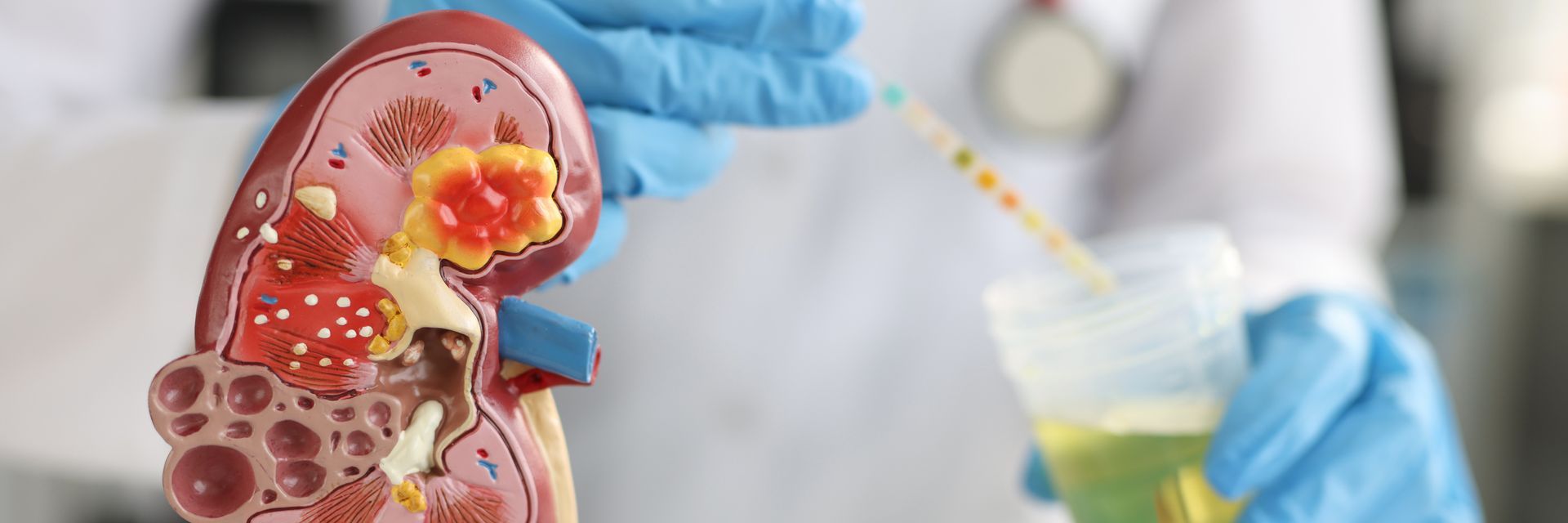INS LifeGuard
Stage 3 Kidney Disease: Symptoms, Causes, Diagnosis & Treatments

Does your recent medical check-up indicate decreased kidney function? Being diagnosed with Stage 3 Kidney Disease can be an alarming revelation. However, know that with timely intervention and management, individuals with Stage 3 Kidney Disease can still lead fulfilling lives while prioritising their kidney health. This blog will delve into the symptoms, causes, diagnosis, and treatment options for Stage 3 Kidney Disease, providing you with comprehensive insights into the nuances of this condition.
What is Stage 3 Kidney Disease?
Stage 3 Kidney Disease is a critical phase in the 5 stages of kidney disease, as it marks a pivotal point where the kidneys have significantly impaired function, but there's still an opportunity to manage and potentially slow down further kidney damage with proper medical intervention and lifestyle adjustments.
In this stage, the eGFR ranges from 30 to 59 millilitres per minute per 1.73 square metres, which means that the kidneys are not working as well as they should, although the condition is not as severe as the later stages of chronic kidney disease and kidney failure.
Symptoms
Symptoms of kidney disease often remain unnoticed until the individual reaches Stage 3 Kidney Disease. Some signs that could manifest include:
- Fatigue and weakness
- Swelling hands or feet
- Dry or itchy skin
- Lower back pain
- Muscle cramps
- Difficulty sleeping
- Restless leg syndrome, making it challenging to sit or fall asleep
- Changes in urination frequency or volume
- Urine that appears foamy or darker than usual
Causes
Stage 3 Chronic Kidney Disease develops when kidney damage reduces their efficiency in filtering waste from the blood. This occurs when kidney damage progresses from earlier stages 1 and 2. This progression can be caused and influenced by various factors, such as:
- Diabetes
- High blood pressure
- Polycystic kidney disease (PKD)
- Lupus
- Exposure to heavy metals like lead
- Recurring kidney infections
- Adverse drug reactions
- Hemolytic uremic syndrome
- Autoimmune conditions like Goodpasture disease
- Rare genetic disorders like Alport syndrome
- Immunoglobulin A (IgA) vasculitis
- Renal artery stenosis
Diagnosis
Diagnosing Stage 3 Kidney Disease, also referred to as Stage 3 Chronic Kidney Disease (CKD), typically involves diagnostic processes, which may include:
Estimated Glomerular Filtration Rate Test
When diagnosing Stage 3 CKD, the kidney doctor frequently relies on a blood test called estimated glomerular filtration rate (eGFR) to assess creatinine levels. This test gauges the kidneys' efficiency in filtering waste and is typically divided into two eGFR result categories:
- Stage 3A CKD: 45–59 eGFR
- Stage 3B CKD: 30–44 eGFR
Blood Pressure Test
High blood pressure can contribute to the progression of kidney disease and increase the risk of complications such as cardiovascular disease. That's why a kidney doctor often recommends maintaining a healthy blood pressure to reduce the risk of further damage and slow the progression of kidney failure.
Urine Tests
Urine tests are conducted to evaluate kidney function and confirm the stage of chronic kidney disease (CKD). They also help monitor conditions such as diabetes, urinary tract infections (UTIs), and other infections that may impact kidney health.
Imaging Scans
Imaging tests may not always be required during Stage 3 Kidney Disease if the cause and progression are well understood through blood and urine tests. However, healthcare providers may recommend them to assess kidney structure and function, detect abnormalities, or monitor for complications like kidney stones or cysts.
Treatment
In Stage 3 Kidney Disease, a kidney transplant is not typically needed as the kidneys are still functioning, though at a reduced capacity. However, the following treatment options may be necessary:
Manage Hypertension
Monitoring blood pressure levels regularly is vital in Stage 3 CKD in order to prevent kidney disease progression to stage 4 or 5 CKD, reduce the risk of cardiovascular complications, and preserve kidney function. Therefore, it's important to incorporate key lifestyle changes such as:
- abstaining from smoking
- engaging in regular exercise and physical activity
- sleeping at least 7 hours a night
- monitoring your weight
- addressing anemia (low red blood cells) if applicable
Manage Blood Sugar
Managing blood sugar in Stage 3 CKD can mitigate the condition by reducing kidney damage caused by high blood glucose levels and preserving kidney function for longer durations. In many cases, kidney doctors often use the A1C test to check how well blood sugar has been controlled over time. This helps them make accurate changes to treatment plans and improve disease management. Other ways to manage blood glucose in Stage 3 CKD include:
- monitoring blood glucose levels regularly
- consuming foods that are low in sugar and carbohydrates
- engaging in regular exercise
- practising relaxation techniques to prevent stress
- adhering to prescribed medications
Healthy Kidney Diet
A healthy kidney diet helps reduce strain on the kidneys, supports proper functioning, and may slow the progression of kidney disease. To maintain a healthy diet for Stage 3 CKD, consider the following:
- adjust protein and potassium intake if blood levels are high
- reduce sodium intake to prevent fluid retention
- incorporate grains, fruits, and vegetables to restrict protein, high-cholesterol foods, salt, and potassium intake
- limit phosphorus to maintain PTH levels, prevent bone disease, and preserve kidney function
- reduce calcium consumption
- minimise saturated fats to lower cholesterol levels
- cut back on carbohydrates if you have diabetes
- limit calcium intake if blood levels are elevated
- consider water-soluble vitamins such as vitamin C (100 mg/day) and B complex
- avoid OTC supplements without nephrologist approval
Medication
For individuals with diabetes but do not have high blood pressure, ACE inhibitors (angiotensin converting enzyme) and ARBs (angiotensin receptor blockers) can be provided to help slow the progression of kidney disease. However, always check with your doctor to make sure your medicines won't make your kidney problems worse and to discuss alternatives if necessary.
Takeaway
While Stage 3 Kidney Disease typically doesn't often progress to Stage 4, it still requires careful management and monitoring to slow down any potential decline in kidney function. If you have Stage 3 Kidney Disease, you may not experience severe symptoms, but you may need to reassess your habits, work with your healthcare provider to create a treatment plan, and look for reliable ways to make your condition more manageable.
At INS LifeGuard, we offer a personal emergency alarm system that individuals with Stage 3 CKD can use to call for assistance in case of any medical emergency. With features that include a 24/7 personal emergency button, two-way communication, and GPS location tracking, you can trust that help is always available, no matter where you are or what time of day it is. Explore our website to find out more about the products and services that we offer.
Learn More About Kidney Disease

About
INS LifeGuard is the only 24/7 nurse on-call personal and medical monitoring in Australia. We provide monitoring technology for both in the home and on the go and can also monitor other provider's equipment. Our services are suitable for anyone wanting support to stay independent such as the elderly, those with medical conditions and disabilities plus enhancing safety and security for lone workers.
Related Articles

-
Visit our website here
I hope you enjoy reading this blog post
INS LifeGuard is the only nurse on-call personal and medical alarm service in Australia. If you would like more information about INS LifeGuards solutions, visit our website here.
I hope you enjoy reading this blog post.
INS LifeGuard is the only nurse on-call personal and medical alarm service in Australia. If you would like more information about INS LifeGuards solutions, visit our website
here.

INS LifeGuard is the only nurse on-call personal emergency response service in Australia. We have a commitment to healthcare innovation which includes personal alarms and medical alert solutions that make independence easier, safer and more enjoyable.
Our services support Seniors, Carers, Providers, NDIS Participants, Retirement Villages, DVA, Lone Workers and anyone that wants the security that help is a press of a button away.
LATEST POSTS
PO Box 485 Unanderra NSW 2526 Australia
INS LifeGuard
International Enquiries
INS CareCall supplies and monitors emergency response equipment and services, including hardware manufactured by Chiptech, Smart-Caller, SmartLink, and the LifeGuard L-Series Diallers.
Monitoring of alarms is provided through INS LifeGuard's unique Emergency Response Centre, which is the only personal alarm response centre staffed by qualified nurses. This is an important distinction.
Quicklinks
Supporting
PO Box 485 Unanderra NSW 2526 Australia
INS LifeGuard
International Enquiries












